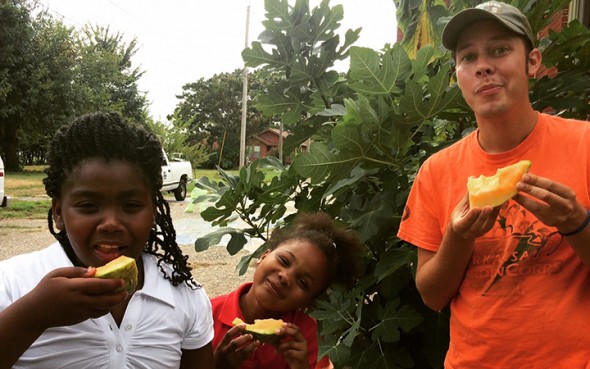When did you know that you wanted to work in food?
I have been concerned with environmental issues since I was very young. I grew up around a lot of conventional agriculture, as well as home gardening. At some point about 10 years ago I learned about organic foods when they became more common in the local grocery stores and immediately made the connection between sustainable foods and environmental stewardship. I've always loved cooking my own meals, but discovering old episodes of Julia Child's The French Chef was really exciting for me. She was so warm and passionate, but also immensely talented, and made gourmet foods accessible. I also spent a lot of time pouring over John Seymour's book The Self-Sufficient Life and How to Live It. At some point everything clicked and I knew that I wanted to combine my love for food and cooking with my passion for the environment. I've been so thankful to have that opportunity with AR GardenCorps.
How did you get your current good food job?
While studying nonprofit management at the Univeristy of Akansas at Little Rock, I learned about Americorps. I had a cousin who had just returned from serving 2 years in the PeaceCorps, so I had a rough idea of what serving with AmeriCorps meant. During my last semester, I was still trying to decide on an AmeriCorps program to apply to, and one of my professors suggested AR Gardencorps. When I read about the program, I knew I wanted to be a part of it. I sent in my application and resume, had a few interviews, and accepted a position serving at the city of North Little Rock's Fit 2 Live initiative.
How did your previous work or life experience prepare you for a good food job?
I didn't think I knew very much about gardening when I started serving with GardenCorps, but I realized that I had actually read quite a bit about it. I had also had a lot of experience with agriculture while growing up. My first job was actually on an industrial turkey farm, and my dad worked for the poultry industry for most of my life. My maternal grandparents were dairy farmers. Having those experiences with industrial agriculture really gave me a different perspective than many people you meet in sustainable ag and organic gardening circles. It's one thing to talk about the problems with industrial agriculture, but putting a human face to the problem is really important when discussing solutions and alternatives. I have seen both ends of the agriculture spectrum and bring that experience with me to my current position.
What was the greatest obstacle you had to overcome in pursuing your Good Food Job dream?
Well, nobody joins AmeriCorps for the money, but the amazing experience more than makes up for the lack of funds. However, there have been times when other better-paying opportunities have come along and I have been tempted to take them. I stayed with my service position because I'm invested in the project and want to see how much I can help it grow and succeed. I have learned to be more frugal and to budget better. That can be hard sometimes, but I remember that it's another life skill that I can take with me into the future when my AmeriCorps term is finished.
Name one positive thing that a former employer taught you that you continue to appreciate?
Persevering while staying positive. It's certainly something that I'm still perfecting, but I've worked with some really great people who have demonstrated how to handle stress and stay positive. I have to say, my female supervisors have all excelled at this. I've been amazed by women who are able to juggle pregnancy, families, personal, professional, and often academic lives. When I see a superior demonstrating how to remain cool under pressure, it inspires me to do the same.
What can you identify as the greatest opportunities in food right now?
There's a lot of opportunity in teaching people to expect good food. When the average person expects good food, it becomes the standard instead of the exception. I think we do this by teaching people how to cook. When they learn that good food is not an intimidating or foreign concept, and that they can actually prepare it themselves, then we'll really see things change around food.
If you could be compensated for your work with something other than money, what would it be?
I feel like I'm expected to say something like fresh ripe tomatoes, but probably coffee if I'm being honest! I do love tomatoes, but I can grow those myself!









